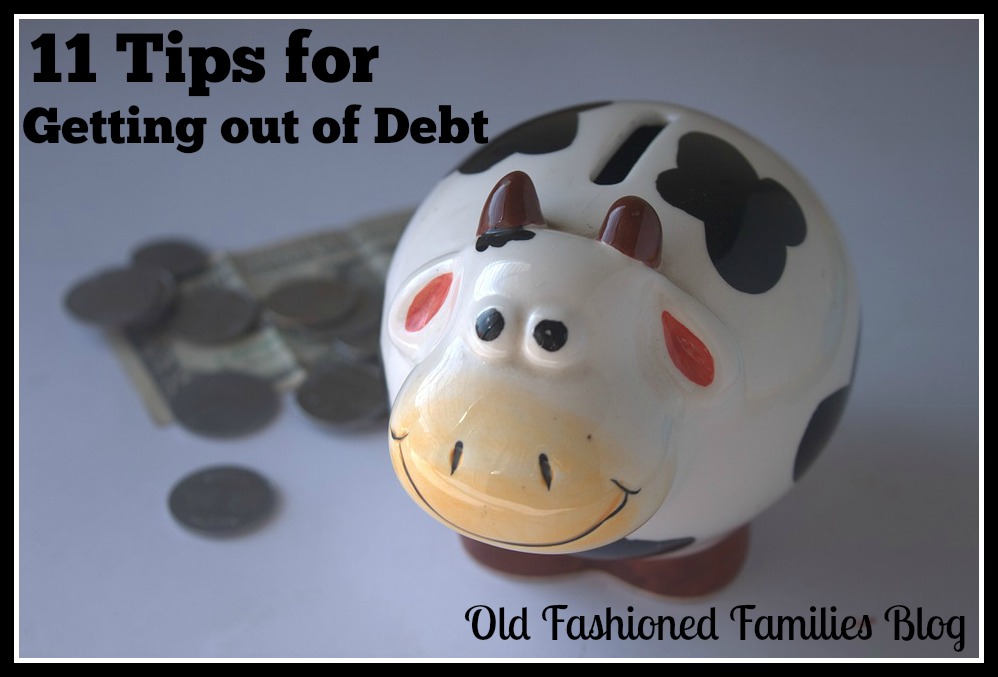Debt is something that a lot of Americans struggle with, so there is definitely no reason to be ashamed. In fact, as of 2015, eight out of every ten Americans were in some sort of debt— and at least 38% of us have credit card debt.
Getting out of debt is a lot easier said than done, and people often struggle for years with payments and interest rates! This is something you’ll want to take care of before starting a homestead, as its a very frugal lifestyle that doesn’t leave you with a lot of spare time. With that being said, today I’d like to discuss 11 tips that can help you get out of debt and get you ready for your old fashioned life!
1) Figure out your debt ratio
The first thing you need to do is face the music and figure out just how far in debt you are, and if it means trouble. You’ll need to total up all of your debts, from student loans to credit cards, and then compare that to your income.
For example, if you earn $60,000 a year and you are $20,000 in debt, your debt ration is .33. If you earn $80,000 a year but have $200,000 in debt, your debt ratio is 2.5. A ratio under .5 is pretty good, and anything over 2 is, well, pretty bad (just being honest). Either way, these tips should help you get that ratio way down!
2) Change your ways and STOP CHARGING
Once you add up all of your debts, you might be able to see a pattern— or a behavior you need to change. Some things, like medical bills, you can’t control but everything else you should try to monitor. My personal downfall is credit cards, simply from trying to live a life I couldn’t afford— which brings me to my next tip.
3) Make an accurate budget, then fix it.
If for whatever reason you don’t have a budget in place, I promise you need one. It’s the easiest way to divvy out exactly where your money should be going.
You’ll want to add up all of your expenses and be extra sure not to leave anything out! I recommend checking last months bank statement for confirmation. Obviously, your budget should never ever exceed your income and if it does you’ll have to make cuts. Once you have your normal expenses laid out, additional payments on loans and such can be added— so long as your income allows it.
4) Boost your income
If you’re at a standstill and there are no more expenses to be cut, you may need to think about trying to supplement your income or search for a better paying job. It doesn’t need to be forever, but you don’t want to remain stagnant with your debt and make minimum payments for the rest of your life. If you need some ideas on how to boost your income, check out this article.
5) Check out the interest rates
List your debts from highest interest rate to lowest interest rate. The one at the top is costing you the most money, so feel free start there but don’t forget about your other loans. You should always try to pay the minimum balance to avoid more interest or even late fees. 
**Note: Option 1 for debt payback
6) Follow the debt snowball
Start with your smallest debt, paying as much as you can on that balance while making minimum payments on the others. The idea behind this is keeping motivations high, as you can cross debts off your list— which is super satisfying— while continuing to lower the balance on other debts. Personally, I recommend going by interest rates, but this is a great idea as well!
**Note: Option 2 for debt payback
7) Forget about the minimum balance whenever possible
This one is pretty self explanatory: you should always try to pay more than the minimum balance even though its hard. The minimum balance is put into place so that whoever is in charge of your loan can maximize profit. Don’t let them take all your money! Make your own minimum!
8) Transfer some balances
Some credit cards have 0% interest rates, at least for a limited time. Essentially, you can take out on of those cards and transfer the balance of a high-interest card to that and save tons! This strategy will take a little more timing and research than the others, so be careful. You can find additional tips for balance transfers here.
9) Keep your emergency fund
Keeping an emergency fund is a good way to make sure you can stay on track while working towards paying off your debt. Car repairs, sickness, or any other emergencies can put a big hindrance on your funds— try to have a rainy day fund in place before you start saving, somewhere around $1,000, for any instance you might need it! That way, disaster won’t interrupt your debt payback.
10) Utilize raises and bonuses
You already made a wonderful budget that you can stick to, so if you get a pay raise or bonus just put that strait to your debt!
11) Ask yourself: Why do I want this?
Keeping your goals in mind as you work towards paying of your debt is a great way to keep motivated and focused. It’s also not a bad idea to reward yourself when you reach a milestone!
Unfortunately, there is no get-rich-quick scheme that can magically make you debt free. It’s going to take a lot of hustle and hard work, and could take months or years. The end result is worth it though; a debt free life where you can focus on the present and the future instead of being haunted by old bills!
How did you guys focus on getting out of debt? Or cut down on monthly expenses? Share with me in the comments below!


Leave a Reply